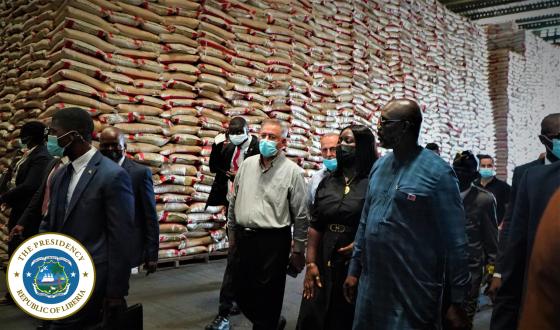Liberia: How to Solve the Rice Problem Now

Flashback: In April 2022, President Weah visited the warehouses of rice importers to ascertain rumors of rice shortage
.... With the focus on the buying of locally produced and owned rice, local employment would rise, local production of rice would go up and rice price would come down accordingly, moving Liberia from the prevailing poverty generation system of the production of raw materials for export without the prioritization of Value Addition to the enduring system of poverty alleviation, where the electoral system would move from Unfair to Fair to elect only persons with good records.
Editor’s note: The views expressed in this commentary are solely of the author and do not necessarily represent that of the Daily Observer newspaper.
On September 25, 2022, my earlier Commentary on Solving The Rice Problem received wide publication locally and globally. However, on account of the fact that the rice problem seems to be degenerating in a 1979-like Rice Problem, it has become necessary for me and other persons who love Liberia to come up urgently with more helpful ways to solve the rice problem now before it turns into an event driven by the rule of outlaw instead of the Rule of Law.
In 1979, the government of Liberia (GOL) was considering a proposal to increase the price of rice from US$11 a 25kg bag to US$15 a 25kg bag. In February 2018, 39 years later, the Rice Importers Association of Liberia appealed to the GOL to increase the price of rice because they were facing higher global freight on board (fob) charges and higher port charges at the local Free Port of Monrovia.
According to the Importers, they made the appeal in order to prevent any rice shortage in Liberia. But the GOL reduced the price of rice from USD16 a 25kg bag to US$13 a 25kg bag, through the reduction of tariff and budgetary support, not wanting the price of rice to be increased.
At the beginning of the second quarter of this year, the GOL displayed warehouses full of rice at the Free Port of Monrovia, leading the GOL to declare that there was enough rice in Liberia. But the Importers said that they could not get access to the rice. This reality of the lack of access to rice led to a rice shortage, resulting in a blockage of traffic for more than an hour near the entry to the Gabriel Tucker Bridge from the Free Port of Monrovia side.
Although the GOL said there was enough rice in the Country, the rice buyers and sellers said they did not have access to the rice. With this lack of access to rice and the rising price of rice, a rice price that is already non-affordable to most people in Liberia, there is a likelihood that violence could break out from the frustration at hand. Not only has the price of rice gone up from US$13 a 25kg bag to US$16 a 25kg bag, two weeks ago, but the price of a 25kg bag of rice is also now US$20 in some places and USD22 in other areas. The price of a cup of rice has risen from L$20 to L$120 in some places and to L$150 in other sites.
At the level of the GOL, it was announced on radio on the morning of October 7, 2022 that 335,000 bags of rice would be in Liberia by the following week. The monthly consumption of rice in Liberia is 750,000 bags. A Legislator said that he had arranged for several truckloads of rice to come from Sierra Leone to Liberia in the midst of reports of the smuggling of rice from Liberia to Guinea and La Côte d’Ivoire. With all of the different reports, confusion among the people has set in and this leads to frustration that can turn into violence.
This violence must be prevented. This is the reason for writing this Commentary to help people understand the rice problem better and become motivated to take non-violent action through the Rule of Law in the drive to solve the rice problem now rather than later. The people who love Liberia must work together to use knowledge about the rice problem to motivate people to solve the problem. Liberia imports US$250,000,000 worth of rice a year.
The money used to import rice, especially as foreigners get the bulk of the money through ownership, can be used to buy rice for Civil Servants, as part of their salaries. This money can be used to buy rice for GOL school students under the School Feeding Program. With the focus on the buying of locally produced and owned rice, local employment would rise, local production of rice would go up and rice price would come down accordingly, moving Liberia from the prevailing poverty generation system of the production of raw materials for export without the prioritization of Value Addition to the enduring system of poverty alleviation, where the electoral system would move from Unfair to Fair to elect only persons with good records.

